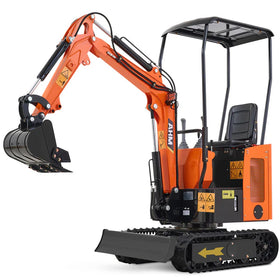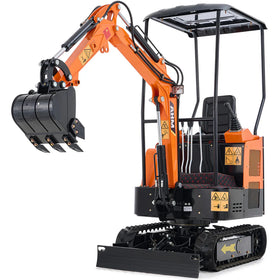Unlike larger machines, mini excavators operate with just 8-10 gallons of hydraulic oil. In such a compact system, even minimal contamination rapidly accelerates component damage, leading to costly repairs and unexpected downtime. Based on equipment service data, contaminated hydraulic oil contributes to over 75% of system failures in compact construction equipment.
Maybe the controls don't respond the way they should, or you hear strange noises when lifting a load. If this sounds familiar, you're likely dealing with hydraulic oil contamination – one of the most common yet overlooked problems in compact equipment.
1. What Happens When Your Mini Excavator's Hydraulic Oil Gets Contaminated?

Simply put, hydraulic oil contamination is anything that shouldn't be in your hydraulic fluid – dirt, water, air, or even tiny metal pieces from normal wear and tear. This matters more in mini excavators because:
- They use a small amount of oil (just 8-10 gallons), so even a little contamination can cause big problems
- They use high-pressure systems (around 3,000-4,350 PSI) that force these contaminants through tight spaces
- The moving parts inside have incredibly small clearances – sometimes as tight as the width of a human hair
Most equipment owners are surprised to learn that keeping your hydraulic oil clean can cut operating costs by nearly half and make components last 2-3 times longer. That's a huge return on a relatively small investment in proper maintenance.
The Three Main Troublemakers in Your Hydraulic Oil
1. Dirt and Particles
This is the most common problem – tiny solid particles that act like sandpaper inside your system. These particles might come from:
- Dirt that sneaks in during maintenance
- Metal bits that break off as components wear
- Dust that enters through breather caps or seals
- Leftover material from manufacturing or repairs
What does this do to your mini excavator? These particles scratch and wear down moving parts. It's like having sand in your car's engine oil. Even particles you can't see with your naked eye can cause damage over time. As one part gets damaged, it creates more particles, which damage more parts – a snowball effect you definitely want to avoid.
2. Water
Water in your hydraulic oil is seriously bad news. It might get in through:
- Condensation that forms when your equipment heats up and cools down
- Pressure washing too close to seals or fill caps
- Leaks in coolers or other components
- Poor storage of your hydraulic oil
What happens when water gets in? It causes metal parts to rust, breaks down the oil faster, and reduces lubrication. In cold weather, it can even form ice crystals that block small passages. The real kicker is that water often hides in the oil – you might not even see it until damage is already happening.
3. Air (Yup, even air could do damage).
Air bubbles in your hydraulic fluid cause erratic operation. They get in through:
- Loose connections on the suction side of your pump
- Oil levels that are too low
- Damaged seals
- Improper bleeding after maintenance
How does this affect your mini excavator? Air makes your controls jerky and unpredictable. It's like trying to drive a car with a partially clogged fuel line – sometimes it gives you power, sometimes it doesn't. Air also creates a phenomenon called cavitation (think tiny explosions inside your pump) that can destroy components surprisingly quickly.
3. How to Check If Your Hydraulic Oil Is Contaminated

You don't need fancy equipment to spot basic contamination problems. Here's how to do a simple check:
- Park your mini excavator on level ground and lower all attachments
- Turn off the engine and remove the key
- Let everything cool down for at least 30 minutes (hot oil can cause serious burns)
- Put on some gloves and safety glasses
- Find the hydraulic oil sight glass or pull out the dipstick
Now, take a good look at the oil:
- Good oil looks clear and amber (like maple syrup or honey)
- Contaminated with dirt looks darker and may have visible particles
- Contaminated with water appears milky or cloudy (like watered-down coffee creamer)
- Contaminated with air looks foamy or has bubbles (like a milkshake)
If you want to get a better look, take a small sample in a clean glass jar. Hold it up to the light to see more clearly.
Remember though, not all problems are visible to the naked eye. Oil can look clean but still contain harmful particles that are too small to see.
When checking your oil, look at its color and clarity through the sight glass or on your dipstick.
Clean hydraulic oil looks like honey - amber and clear. If you see oil that's dark, cloudy, or has a milky appearance, you're looking at contamination in action.
Foam or bubbles in your oil indicate you've got air in the system, which is another form of contamination that needs attention.
We have a detailed guide on how to check you hydraulic oil guide for you if you're interested in read more about it.
4. How To Prevent Hydraulic Oil Contamination
Prevention is way easier (and cheaper) than fixing problems after they happen. Small daily habits make a big difference!
Make these simple practices part of your routine:
- Keep it closed: Only open hydraulic components when absolutely necessary, and close them promptly
- Check levels correctly: Wipe dipsticks clean before checking, and keep the area around fill caps clean
- Maintain breather caps: These allow your system to "breathe" without letting contaminants in
- Clean connections: Wipe hydraulic fittings before connecting attachments
- Store smart: Keep your mini excavator under cover when possible to reduce exposure to the elements
Equipment owners who follow these basic practices report nearly 50% fewer hydraulic-related problems. That's a huge return for some simple habits.
Maintenance Done Right
When you need to work on your hydraulic system:
- Clean workspace: Set up in the cleanest area possible – a shop floor is better than a muddy job site
- Clean before opening: Thoroughly wipe down any area before removing caps or filters
- Use the right tools: Keep a set of clean tools specifically for hydraulic work
- Handle oil properly: Use clean containers and funnels with filters when adding oil
- Filter new oil: Don't assume new oil is clean enough – it usually isn't
Here's something many people don't realize: brand new oil from the barrel typically isn't clean enough for modern hydraulic systems. Filtering new oil before adding it to your system is one of the smartest moves you can make.
Filters: Your First Line of Defense
Your mini excavator's filters are working hard to protect your investment:
- Change them regularly: Replace filters according to your manual – typically every 250-500 operating hours depending on the type
- Use quality filters: Don't skimp here – cheap filters often let too many particles through
- Install them properly: Clean the area before installation and apply clean oil to gaskets
- Check indicators: Many systems have indicators that tell you when filters need changing
For about $50-100 per filter and a few minutes of your time, you're potentially saving thousands in repair costs.
5. The Real Cost of Contaminated Hydraulic Fluid
Contaminated hydraulic oil damages your mini excavator's critical components with every hour of operation.
A contaminated system faces three immediate impacts: accelerated pump wear, seal deterioration, and valve damage. These issues compound quickly - a damaged pump works harder, causing faster oil degradation, which then speeds up wear on other components.
The financial impact is substantial. A hydraulic pump replacement typically costs between $2,000-3,500, while a complete system overhaul can exceed $8,000. Factor in 2-3 days of downtime for repairs, and you're looking at significant lost revenue on top of repair costs.
Regular oil analysis and filter changes, costing around $200-300 annually, prevent these expensive repairs and protect your investment.
6. When to Call the Professionals

Some signs mean it's time to get expert help:
- Your machine's performance changes suddenly during a job
- You hear unusual noises that don't go away
- Operating temperatures climb above 140°F
- The oil looks obviously degraded
- Multiple warning signs appear together
AHM understand these challenges and can help diagnose and solve contamination issues before they lead to major repairs. Our service teams have the expertise and equipment to test oil quality thoroughly and recommend the right solutions for your specific situation.
7. Maintaining Peak Performance Of Your Mini Excavator
Mini excavator could be a significant investment, and its hydraulic system is crucial to its operation. By understanding contamination signs and following proper maintenance procedures, you can significantly extend your machine's service life and maintain its performance.

If you are interested in reliable mini excavators built with maintenance in mind, visit AHM website. AHM mini excavators feature advanced filtration systems and are designed for easy maintenance access, helping you prevent contamination issues before they start.
Because when it comes to hydraulic oil contamination, prevention is always better - and cheaper - than cure.







